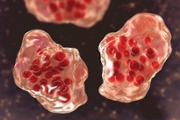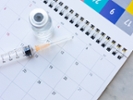|
|
 
| |
 |
| (Kateryna Kon/science Photo Library/Getty Images) |
Measles cases in the US have reached a 33-year high, with 1,723 cases reported in 42 states, according to the CDC. Most cases involve unvaccinated individuals, and there have been three deaths and numerous hospitalizations.
In practice: Adam Ratner, director of pediatric infectious diseases at Hassenfeld Children's Hospital at New York University Langone, emphasizes the importance of vaccination and shares insights on diagnosing and treating measles, highlighting the disease's high contagiousness and potential complications such as subacute sclerosing panencephalitis.
|
|
|
|
Earn your MA in Healthcare Administration online from Northwestern. Build expertise in leadership, strategic planning, financial management, and more. Flexible, part-time program designed for professionals ready to advance their careers.
|
|
|
| ADVERTISEMENT |  |
|
 
| Nursing, Health & Medical Science |
A small Phase 2 trial found nurse-led telehealth follow-up using the Measure of Ovarian Symptoms and Treatment Concerns patient-reported index was effective for patients with ovarian cancer after chemotherapy. The study, published in the Annals of Oncology and presented at a meeting of the European Society of Medical Oncology, reported high satisfaction among patients and nurses, with no delay in recurrence diagnosis, and researchers said a larger study is warranted. |
|
| |
 |
| (Jackyenjoyphotography/Getty Images) |
About 23% of US adults received a COVID-19 vaccination last season, compared with 47% who got a flu shot, according to the CDC, and health experts are concerned that vaccination rates may decrease even more this year due to conflicting advice and new, narrower federal recommendations. "A lot of misinformation is going around regarding COVID," said Alein Haro-Ramos, an assistant professor at the University of California-Irvine, adding, "Vaccine hesitancy is going to increase."
|
|
A study published in JAMA Network Open found that self-hypnosis was associated with a 53% reduction in hot flashes for menopausal women, compared with a 41% decrease in a control group that listened to an audio file of white noise. "It can be practiced at home ... and it is relatively inexpensive compared to in-person sessions," said lead researcher Gary Elkins. |
|
|
|
|
Harness dormant customer data goldmines trapped within disconnected systems. A trusted identity setup is key for a panoramic perspective. Unite your information to cultivate enhanced growth, vital insights, and a strategic edge. Download the whitepaper now. |
|
|
|
| ADVERTISEMENT |  |
|
 
The US received a D+ for its 10.4% preterm birth rate for the fourth consecutive year, according to a March of Dimes report. The report highlighted significant disparities, with a 9.5% preterm birth rate for babies born to white mothers, compared with 14.7% for babies born to Black mothers. Data showed improved preterm birth rate percentages in 19 states, while the numbers worsened in 21 states, according to the CDC.
| Full Story: Axios (11/18) |
|
|
|
AI-powered toys like the teddy bear Kumma have shown serious safety risks by offering harmful advice to children, including how to find knives or light matches. These failures, driven by breakdowns in safeguards during extended interactions with models such as OpenAI’s GPT-4o, highlight growing concerns as AI toys become more embedded in children’s play.
|
|
|
|
|
AI, quantum, and hybrid computing are rewriting the rules of cybersecurity. Join us December 2 at 2PM EST for an exclusive webinar exploring the trends, tools, and tactics that will define 2026. Discover how to future-proof your defenses and outsmart evolving cyber risks. Register today. |
|
|
|
|
|
 
| Legislative Policy & Regulatory News |
| | | |
